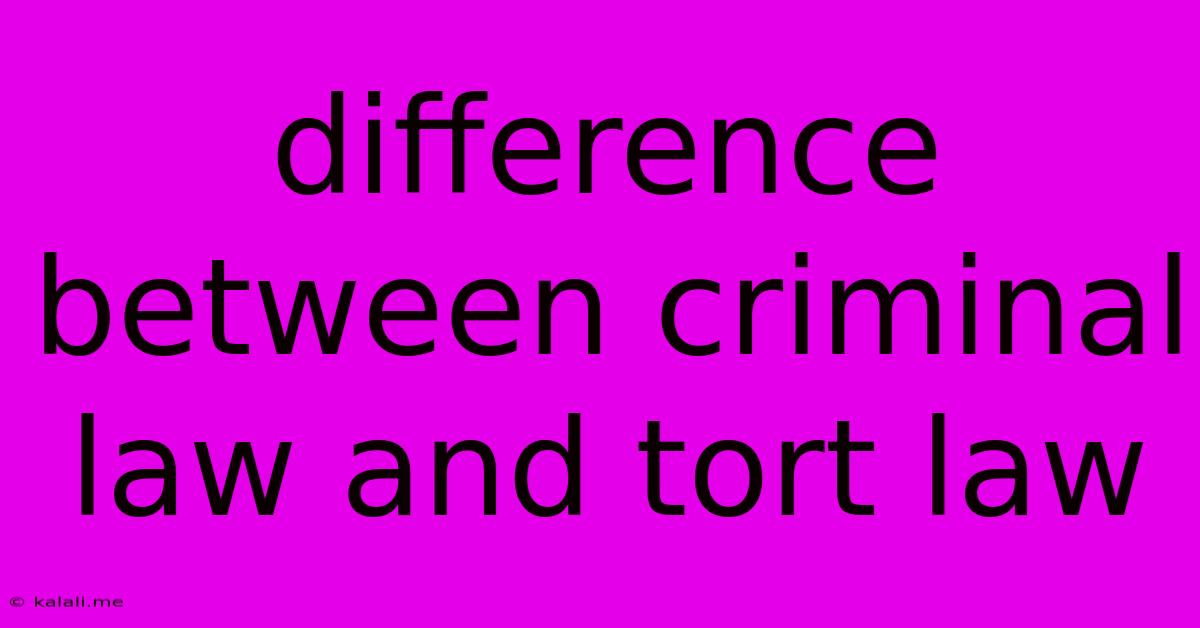Difference Between Criminal Law And Tort Law
Kalali
Jun 14, 2025 · 3 min read

Table of Contents
Criminal Law vs. Tort Law: Understanding the Key Differences
Understanding the difference between criminal law and tort law is crucial, especially if you're involved in a legal dispute. While both deal with wrongdoing, they differ significantly in their purpose, procedures, and consequences. This article will delve into the core distinctions between these two branches of law, clarifying their unique characteristics and applications.
What is Criminal Law?
Criminal law concerns actions that are considered harmful to society as a whole. The state prosecutes individuals or organizations accused of committing crimes, aiming to punish offenders and deter future wrongdoing. Key features of criminal law include:
- Public Prosecution: The government, represented by a prosecutor, initiates legal proceedings against the accused.
- Beyond a Reasonable Doubt: The burden of proof rests on the prosecution to prove the defendant's guilt beyond a reasonable doubt – a very high standard of proof.
- Punishment: If found guilty, the defendant faces penalties like imprisonment, fines, probation, or community service. The focus is on punishment and societal protection.
- Examples: Murder, assault, theft, fraud, and drug trafficking are all examples of criminal offenses.
What is Tort Law?
Tort law, on the other hand, addresses wrongful acts that cause harm to an individual or their property. Unlike criminal law, tort law focuses on compensating the victim for their losses rather than punishing the wrongdoer. Key features of tort law include:
- Private Action: A lawsuit is initiated by the injured party (the plaintiff) against the person who caused the harm (the defendant).
- Preponderance of Evidence: The plaintiff must prove their case by a preponderance of the evidence – meaning it is more likely than not that the defendant is responsible. This is a lower standard of proof than in criminal law.
- Remedies: Successful plaintiffs may receive monetary damages (compensatory or punitive), injunctions (court orders to stop certain actions), or other forms of relief. The focus is on compensation and redress for the injured party.
- Examples: Negligence (car accidents, medical malpractice), defamation (libel and slander), trespass, and product liability are common tort claims.
Key Differences Summarized:
| Feature | Criminal Law | Tort Law |
|---|---|---|
| Purpose | Punish offenders, protect society | Compensate victims, redress wrongs |
| Initiator | The state (prosecution) | The injured party (plaintiff) |
| Burden of Proof | Beyond a reasonable doubt | Preponderance of the evidence |
| Outcome | Imprisonment, fines, probation, etc. | Monetary damages, injunctions, other remedies |
| Focus | Punishment and deterrence | Compensation and redress |
Overlapping Cases:
It's important to note that some actions can lead to both criminal and civil (tort) lawsuits. For example, a single act of assault could result in criminal charges filed by the state and a separate civil lawsuit by the victim seeking compensation for their injuries. In such cases, the criminal case and the civil case are handled separately, with different standards of proof and potential outcomes.
Conclusion:
Understanding the fundamental differences between criminal law and tort law is essential for navigating legal issues. While both deal with wrongdoing, their aims, procedures, and consequences differ significantly. Knowing which legal framework applies to a specific situation is crucial for determining the appropriate course of action and achieving a just resolution. If you are facing a legal issue, consulting with an attorney is always recommended to understand your rights and options.
Latest Posts
Latest Posts
-
Choose The Correct Statements About Dna Synthesis
Jun 15, 2025
-
Lcm Of 8 12 And 15
Jun 15, 2025
-
What Is The Lcm Of 3 8 And 12
Jun 15, 2025
-
Words To Describe A Great Mom
Jun 15, 2025
-
The Average Salinity Of Seawater Is
Jun 15, 2025
Related Post
Thank you for visiting our website which covers about Difference Between Criminal Law And Tort Law . We hope the information provided has been useful to you. Feel free to contact us if you have any questions or need further assistance. See you next time and don't miss to bookmark.